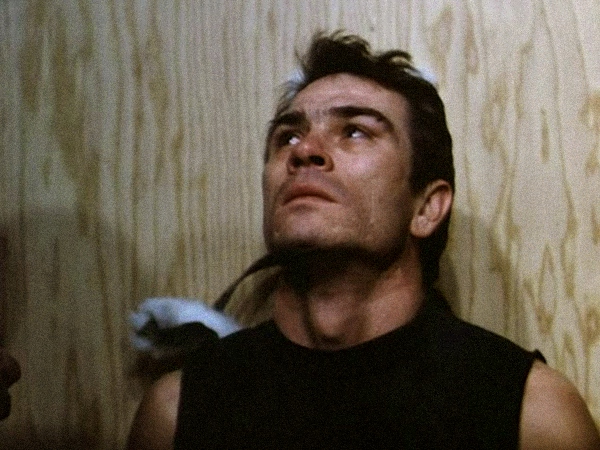| Reviews & Columns |
|
Reviews DVD TV on DVD Blu-ray 4K UHD International DVDs In Theaters Reviews by Studio Video Games Features Collector Series DVDs Easter Egg Database Interviews DVD Talk Radio Feature Articles Columns Anime Talk DVD Savant Horror DVDs The M.O.D. Squad Art House HD Talk Silent DVD
|
DVD Talk Forum |
|
|
| Resources |
|
DVD Price Search Customer Service #'s RCE Info Links |
|
Columns
|
|
|
Executioner's Song: Special Edition, The
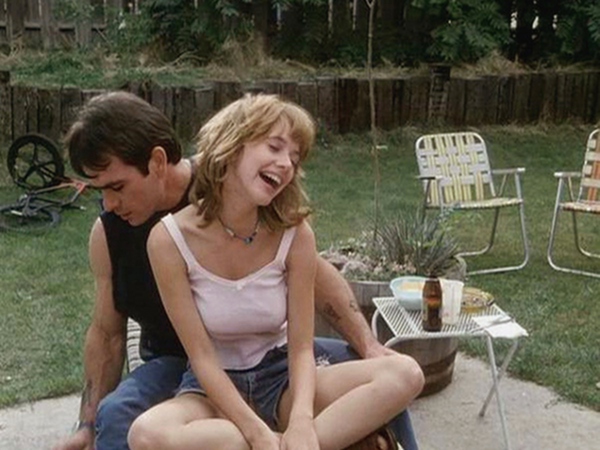 Based on Norman Mailer's 1979 Pulitzer Prize-winning novel of the same name, Lawrence Schiller's 1982 made-for-TV adaptation of The Executioner's Song originally aired over two nights and likely shocked audiences with its chilling portrait of real-life convicted murderer Gary Gilmore. As portrayed by Tommy Lee Jones -- who remained in-character during the entire production, according to co-star Rosanna Arquette -- Gilmore is an intense, impulsive man who, freshly released from a 12-year sentence for armed robbery, finds himself making the same mistakes he did as a younger man. Despite settling down with 19-year-old single mom Nicole Baker (Arquette, in one of her first major roles) and getting a job with tough-as-nails uncle Vern (Eli Wallach), it's not long before his selfishness and short temper lead to abuse, theft, and the cold-blooded murder of two local clerks. Gilmore is thrown no shortage of lines before, during, and after these murders: there's his unearned job, a generous auto loan that he continually misses payments on, and the tough love of his cousin Brenda (Christine Lahti, Running on Empty), just for starters. Even his planned execution is granted several stays by relatives, public officials, and the ACLU. And though it's obvious that his relationship with Nicole and her two young kids is just a disaster waiting to happen -- at the very least, she's an easy target for his manipulative, jealous nature -- at least she keeps him from roaming around so much. But Gilmore throws away everything handed to him: he burns through second chances as fast as six-packs, and eventually convinces himself that he'll just pay for sins in his next life. Not surprisingly, Gilmore pushes for his own execution after the murders; this is a clear microcosm of his tendency to take the easy way out, and he gets his wish in the end. Gilmore's story was quite the media circus back in 1976 and early 1977, with Mailer's book arriving two years later. The author's relationship to Glimore's case -- as well as his close friendship with director Lawrence Schiller, who's even portrayed in the film by actor Sam Keats as "Larry Samuels" -- led to this made-for-TV production, whose teleplay was even written by Mailer himself. The two-part broadcast version clocks in at just over three hours, and at least three variations exist: a more graphic uncut version that aired on HBO, a 135-minute European theatrical cut (essentially, a shorter "uncut version"), and a Director's Cut that resembles the European version with less nudity. To date, and as far as I know, only the Director's Cut is available on Region 1 DVD, which we reviewed in 2008.
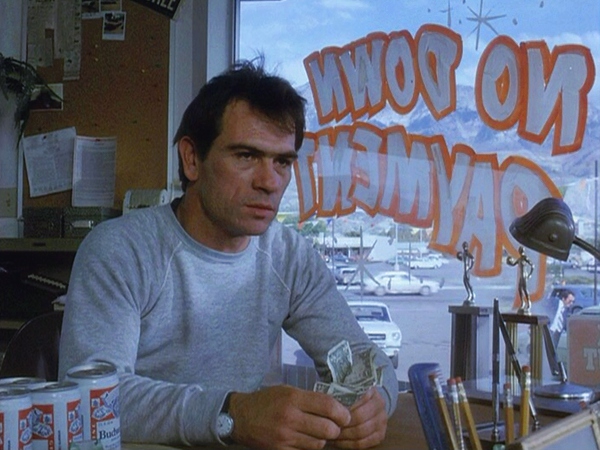 Kino's new Special Edition Blu-ray narrows that gap, at least slightly: it presents both the original broadcast version and the Director's Cut on two separate discs...and having never seen the former, that's the version I watched first (one point of clarification: the labels on both discs are switched, which might confuse newcomers). Not surprisingly, it offers a more detailed and novelistic account of Gilmore's downward spiral, only hampered by a few obvious overdubs that soften some of the language; double murders are fine, as long as you don't swear too much. We get to know a few supporting characters better as well, which makes the fallout even more tough to stomach at times. The structure is also a bit different: Part 1 begins with a three-month flash-forward to the second murder scene, and both halves (complete with their own credits) divide The Executioner's Song cleanly. But more importantly, the original version feels better because it seems to paint Gilmore in a less sympathetic light: even ignoring the dialed-down outbursts due to network constraints, we're given more warnings of his impending spiral, such as an early sequence where he smashes the windshield of an old flame who doesn't answer her door. There are other differences as well: Gilmore's actual last words before execution ("Let's do it") are omitted for the Director's Cut...and considering his execution follows a party scene where Gilmore back-pats and hugs some of the guards goodbye, such snaps back to reality are a necessary part of reminding us what a cocky, self-centered asshole Gilmore really was. Even so, neither iteration of The Executioner's Song is a particularly life-changing or even necessary production. The source story and its adaptations -- both the original book and this small screen movie -- can't help but stink of exploitation below the surface, especially considering Schiller's pursuit of the lucrative story rights and Mailer's involvement in the release of murderer Jack Abbott so they could publish his first book. Arquette, according to the same conversation mentioned earlier (included on Kino's Blu-ray as a bonus feature), sustained a lifelong shoulder injury during a particularly violent scene where Jones threw her out of a car; meanwhile, the frightened pre-schoolers in the backseat ---both untrained child actors -- were screamed at before being tossed out behind her. I'd rather just totally forget Gilmore ever existed if that meant those things never had to happen.
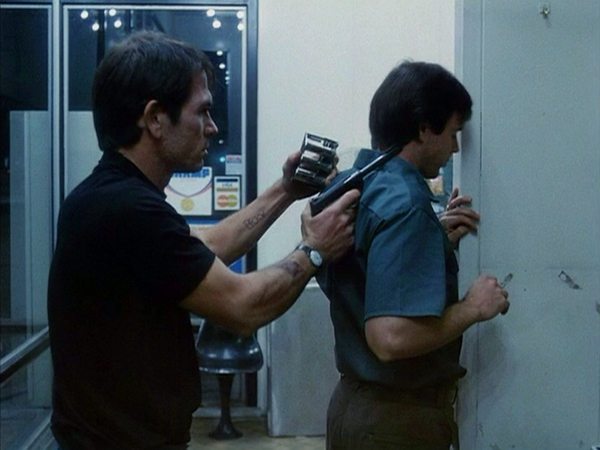

 Both the original and Director's Cut versions of The Executioner's Song are presented in a 1.33:1 aspect ratio -- and though DVD Talk reviewer Paul Mavis expressed disappointment over Paramount's 2008 DVD, Kino's new Blu-ray looks quite a bit better overall. While there doesn't appear to have been any significant amount of restoration done, this is obviously a newer scan of the source elements: colors and image detail are much more clearly defined and crisp, with a fair amount of depth and texture during outdoor scenes. Dimly-lit interiors and nighttime sequences pale in comparison, though: speckles and other bits of debris can be spotted, and shadow detail is dialed back considerably as well. But overall, most of the more obvious problems here are likely source material limitations and, in some cases, they don't seem all that out of place due to the unsavory subject matter.
Similarly, both included versions of The Executioner's Song sport their original DTS-HD 2.0 Master Audio mixes in a split mono format. There are much more obvious source material limitations here: star Rosanna Arquette mentions in her included interview that the audio recording was very inconsistent and required a lot of looping and other ADR techniques. This means that fidelity can waver quite a bit at times; at worst, it's muffled but still mostly intelligible. (Optional English subtitles have only been included during the Director's Cut, which is beyond frustrating.) Music cues by Waylon Jennings and the like are balanced nicely without fighting for attention and, while there's no substantial depth between the foreground and background, what's here is passable under the circumstances.
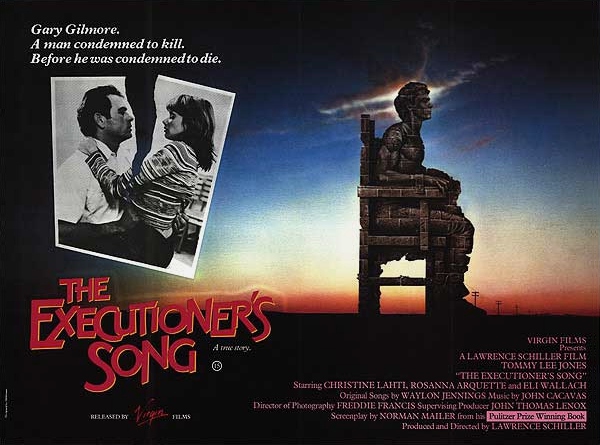
 The static interface -- sporting a different image on each disc -- offers simple navigation, a clean layout, and minimal pre-menu distractions. Options are included for chapter selection, subtitles, and extras. This two-disc release comes in a dual-hubbed keepcase with a booklet highlighting recent Kino titles. As mentioned earlier, the disc labels are incorrectly swapped, which may be corrected in future pressings.
 Just a short but enjoyable Interview with star Rosanna Arquette (7 minutes), who discusses her initial casting, Tommy Lee Jones, an on-set injury, the frequent audio issues, and her friendship with the real Nicole Baker. She obviously doesn't have much time to go into detail, but even a small amount of retrospective comments is better than nothing.
 The Executioner's Song offers a capable but unsettling portrait of Gary Gilmore's infamous 1976 double murder and the execution he wished upon himself months later. It earns a few points for Tommy Lee Jones' intense portrait of the self-centered and impulsive Gilmore, as well as the solid supporting performances by Rosanna Arquette, Christine Lahti, and Eli Wallach. The production values are great too; at times, this really feels like a documentary. Yet it's hard to really love The Executioner's Song for similar reasons: the exploitative nature of such adaptations, especially those who absolutely ignore the victims, hardly make them worth the trouble. It's the kind of movie that just makes you want to take a shower after the credits roll. But Kino deserves their own points for upgrading the film for established fans: we get two separate (and very different) cuts on two separate discs, while both look and sound better than ever. Recommended, but for those reasons only. |
|
| Popular Reviews |
| Sponsored Links |
|
|
| Sponsored Links |
|
|
| Release List | Reviews | Shop | Newsletter | Forum | DVD Giveaways | Blu-Ray | Advertise |
|
Copyright 2024 DVDTalk.com All Rights Reserved. Legal Info, Privacy Policy, Terms of Use,
Manage Preferences,
Your Privacy Choices | |||||||









